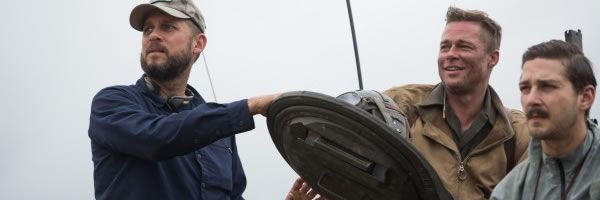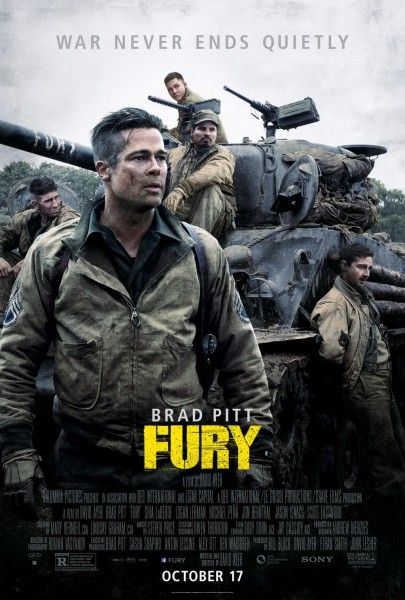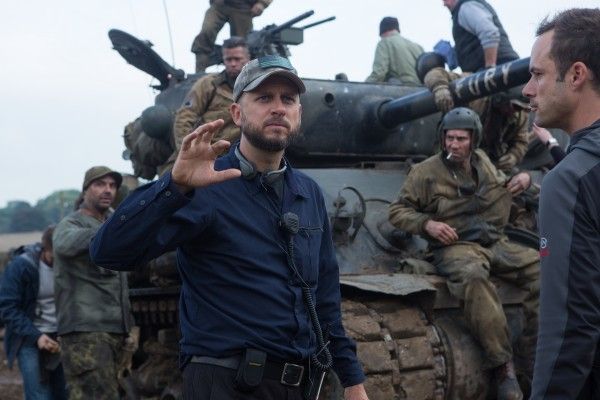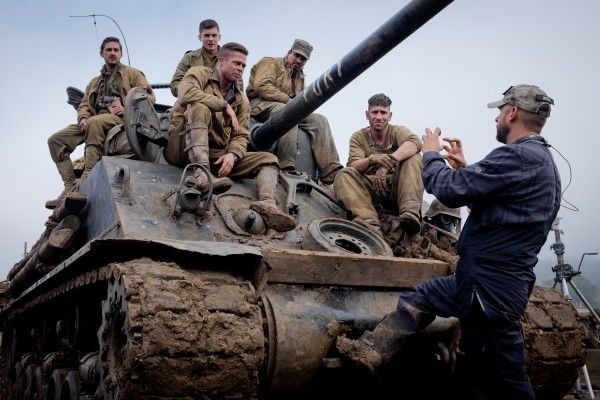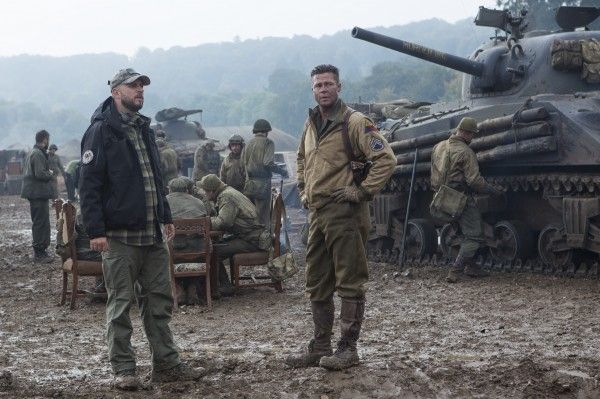Fury, written and directed by David Ayer (End of Watch), is a highly intense, very real and extremely personal look at war and the family that can get you through it. It’s April 1945 and army sergeant Wardaddy (Brad Pitt) commands a Sherman tank and its five-man crew. Outnumbered and outgunned, the men face overwhelming odds in their attempts to strike back at Nazi Germany. The film also stars Shia LaBeouf, Logan Lerman, Michael Peña, Jon Bernthal and Jason Isaacs.
At the film’s press day, filmmaker David Ayer spoke to Collider for this exclusive interview about how the final film compares to what he had originally envisioned, how the first visual image was always the opening that he wanted, that his first cut of the movie was almost four hours long, that there will be some deleted scenes on the Blu-ray, but that this is his director’s cut, that this was his ending, as written, and why he wanted the actors to so deeply immerse themselves in their roles. He also talked about how he’s at his strongest when he’s written the script that he’s directing, the possibility of him doing a female-centric story, Suicide Squad, and more. Check out what he had to say after the jump, and be aware that there are some spoilers.
Note: this interview was done before the confirmation that Ayer would be directing Suicide Squad for DC/WB.
Because this has been such a personal project to you, for a long time, how does the final film compare to what you had envisioned, going in?
DAVID AYER: The movie on the screen is always going to be different from the movie in your head. How it makes you feel is what I’m after, what I’m chasing, and what I’m trying to construct. So, how it makes people feel is exactly what I wanted to achieve. The hardest thing, as a director, is that it’s never right. Nothing you do is ever right. It’s never exactly how you envision it. Making a movie is about making it better. I’m really happy with the final result, but getting there was painful.
Your movies always do a great job of setting up what audiences can expect with the opening scene, and this is no exception. Was that always the opening scene that you wanted, or did that change and evolve, as well?
AYER: Yeah, the first visual image that came to me was always that opening with the horse and rider appearing out of the mist. It’s a timeless image that can be from any time. And then, the horse moves into this tank graveyard, and yet there’s life in the graveyard. That was always a very important visual for me because it sets up so much of the story in the film. It’s a little piece of dream language. There’s definitely some symbolism at play there. And it’s just a great introduction for Brad’s character.
This also feels like it has no fat, at all. How long was your first cut of the film?
AYER: The very first cut of the movie was almost four hours. The worst part of directing is always seeing that first assembly. It’s devastating. It really is. It’s like going into the delivery room and you can’t wait to see your baby, and it’s a crocodile. What happened?! And then, you reshape it and, eventually, it’s the baby you wanted. I think it’s a testament to the acting, that you really believe these guys and buy the characters. It’s as much of a study of a family, as it is a war movie. It’s really about a family that happens to live in a tank and kill people for a living. That’s what I think is magnetic. That’s what I think holds the audience’s interest. You really feel their pain, their love and their joy, and you see how they endure this. That’s what makes it compelling to watch.
When you have that much footage to cut out, are you hoping to do an extended cut?
AYER: No. They’ll drop some of the deleted scenes into the Blu-ray, but this movie really is my director’s cut. There was never any pressure to take time out. It was the opposite situation. I’m pretty ruthless, I think because I started as a writer. I hit that delete key when I write, and I hit the delete key when I direct. This actually had the reverse thing happen where the studio was like, “What happened to that? We loved that. Put it back.” It’s through that see-sawing, and that back-and-forth of taking things in and out, that you find the movie. The movie reveals itself. You shoot a great scene, and it’s great acting and a great performance and the writing is good and it works, but you’re always looking at how it affects the whole. If it doesn’t service the movie, overall, it goes.
You also have a tendency to shoot different endings for your films. Did you do that with this? Was there ever any other outcome?
AYER: No, this ending is as written. The script came out really fully formed and fully realized. There’s a lot of guess work when you make a film. You want it to work, but you’re not sure and sometimes you hedge your bets. But in this case, I really trusted what I had to say and I really trusted my vision and I really trusted these actors to tell this story.
The actors in this film give such terrific performances, but some of them are also very recognizable. Was it important to you that they fully commit and really give themselves over to these roles?
AYER: Yeah, for me, that’s a big challenge. It’s important for me to take very famous, well-known people and not have them play themselves and not have them be seen as themselves. I think great acting is about inhabiting a skin and transforming yourself, and Brad absolutely did that. Brad got lost in the world. He feels of that world and of that time. The movie is a character study of him, in a big way. In the case of Shia, there’s no show-boating. He’s just present and incredibly natural and incredibly believable. You see this pain in his eyes. He’s really playing the mother of this family in this tank. In a lot of ways, he’s Brad’s conscience. We had to dirty Brad up and put him in this worn uniform and get him comfortable. The reason they disappear into this world is because they were so comfortable with the tank. They knew their battle stations and they knew how to operate it. That’s a big part of the illusion, and that’s a testament to how hard these guys worked.
Warner Bros. has expressed interest in having you direct Suicide Squad. Is that something that you’re interested in?
AYER: Rumors. Just rumors. It’s all rumors. I can’t confirm anything.
Have you considered directing something that you haven’t written, or is it important to you to keep directing your own material?
AYER: What I’m going to do next, I’m pretty sure I’ll be writing the script.
Are you always writing things? Do you have scripts in a drawer that you’d love to revisit, at some point?
AYER: My old scripts suck, so I wouldn’t want to direct them. But, I definitely have some planes that I want to land. I have stories that are circling and orbiting, just waiting for the right time to come down and be realized. I feel like, as a filmmaker, I’m at my strongest when I write the script and when it comes from me, out of whole cloth. That’s been a lesson for me. My best work has always been self-generated.
You’ve told such great stories about brotherly bonds and friendship, but I’ve always thought it would be great to see what kind of female-centric story you would tell. Is that something that you would consider?
AYER: Yeah, absolutely. Stories of friendship are very interesting to me. Artificial families are something I like to explore. Whether it’s a bunch of guys or a bunch of ladies, there’s something interesting about that. For me, I like to show what guys are like when no one is looking and how we really are, and that we can be emotional and have these emotional lives. I think it would be great to do a film where we see some females and what’s going on there when we’re not around.
Fury opens in theaters on October 17th.

